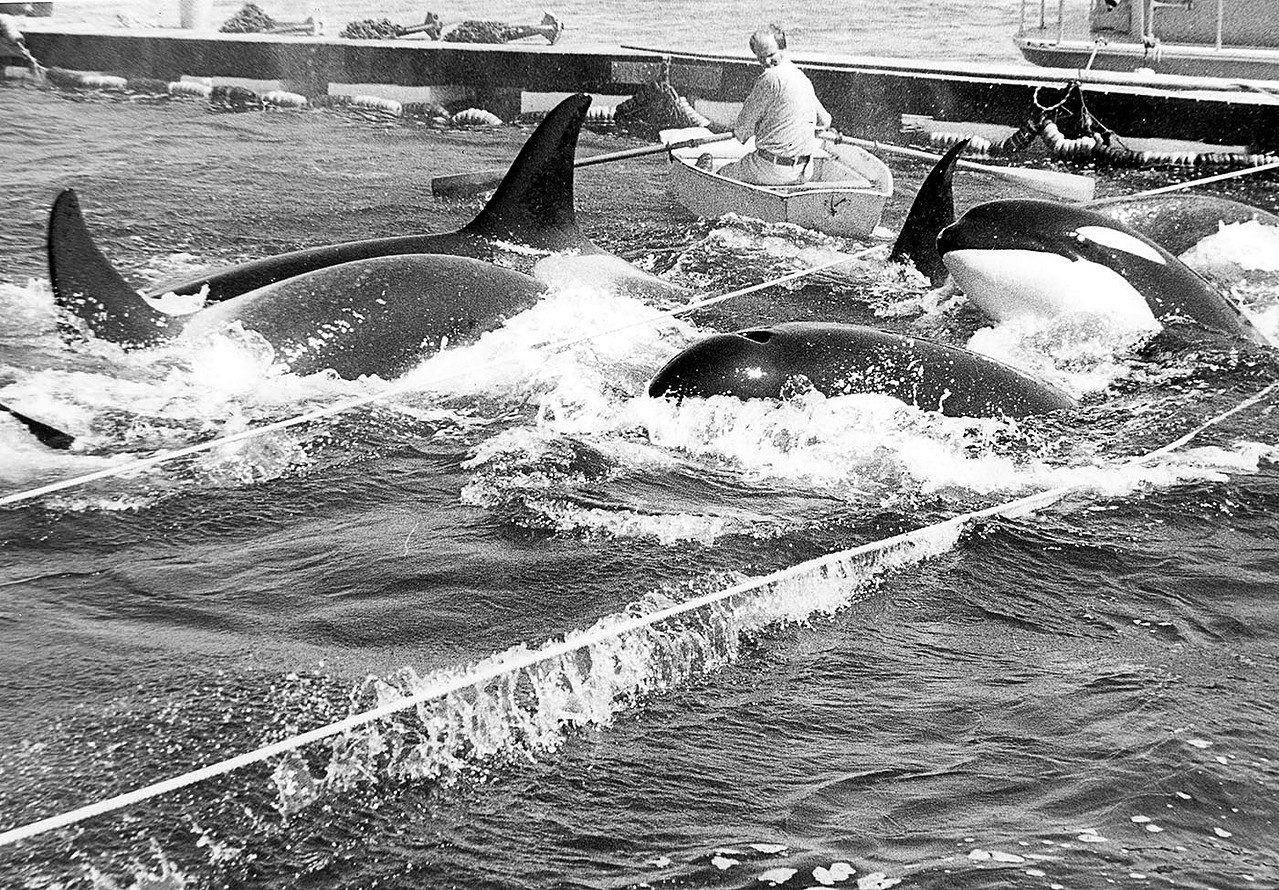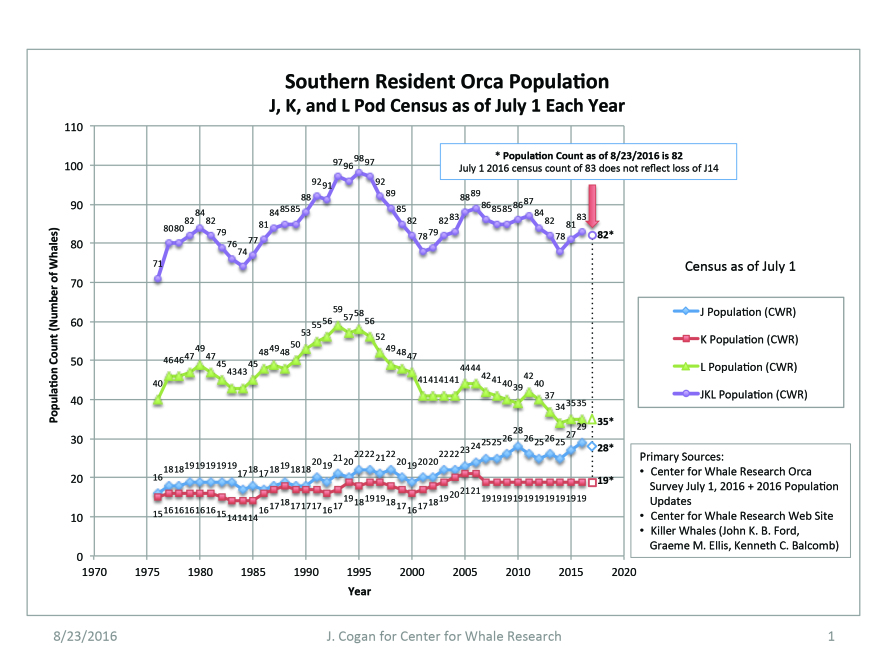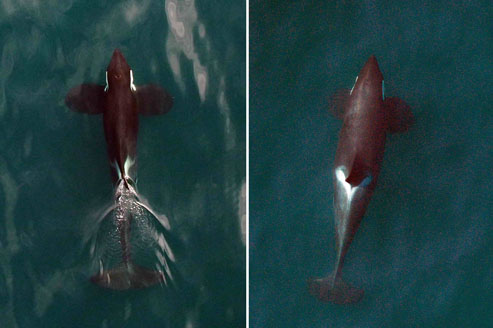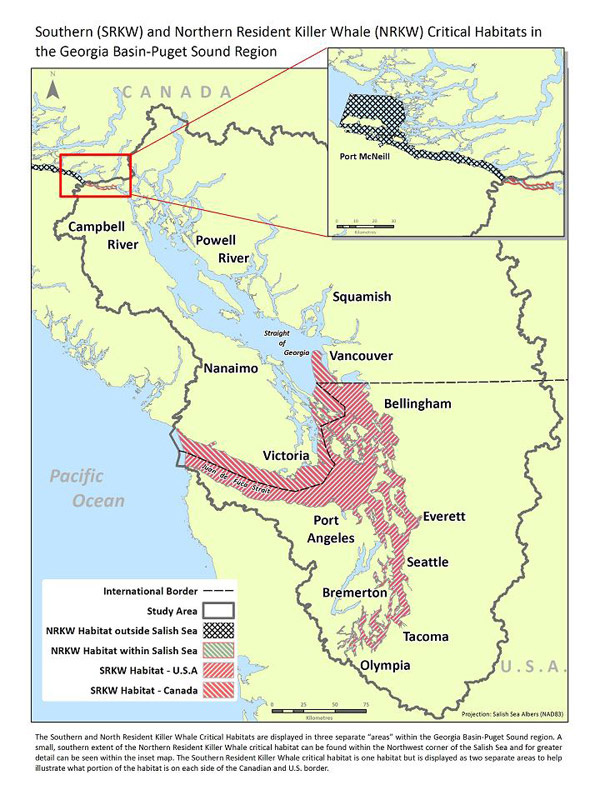We hope you’ve enjoyed the blogs we’ve shared during Orca Awareness Month, where we’ve been discussing the three major threats to the southern residents:
In this blog, we outline a bit of the history of orcas in the Pacific Northwest, and share how you can give orcas a voice by providing feedback before July 14 and help the federal government prioritize action to protect these whales.
The History

Penn Cove Capture August 8th, 1970. Courtesy Wallie V. Fun Photographs, Center for Pacific Northwest Studies
Little was known about orcas in the Pacific Northwest prior to the 1970’s. Assumptions were that thousands of orcas roamed the seas and that they were dangerous killers who would attack anything, including humans, at every opportunity. From 1964 to 1973 orcas were live-captured to put the whales in aquaria, with the southern residents being the most highly targeted population of orcas on the coast due to the ease of trapping the whales in the inland waterways of the Salish Sea while they followed the seasonal salmon runs. The population suffered a loss of at least 46 whales during this time.
The live capture was put on hold by both Canadian and American governments in the Pacific Northwest in 1974, largely due to public outcry about the inhumane nature of the capture events. Both governments also wanted to determine how large the population was by conducting a population survey so that they could decide how many permits to issue for further captures. The first census found there were only 71 whales who remained in the southern resident population, and it was decided that the population was too small to supply any more whales for the captive whale industry. Since that time, the population peaked at 96 orcas in 1996 while today, it sits at only 78. But the number alone doesn’t tell the whole story. This population has very few reproductive females, which means fewer babies born, and there are high mortality rates amongst its young. This along with the growing threats to their habitat underscores what a terrible position the orcas are in.
In 2003, southern resident killer whales were listed as Endangered in Canada under the newly approved Species at Risk Act. In 2005, the United States listed this same population of orcas as Endangered under their Endangered Species Act. The first step taken once a population is listed as endangered in Canada, is the development of a recovery strategy, which was due to be released in 2006 for the southern resident orcas. However, it took another year and the threat of a lawsuit from Georgia Strait Alliance and other environmental groups before it was released in 2007, with the orcas’ critical habitat identified. Identifying and protecting the critical habitat of the orcas is essential for their recovery.
By 2009, GSA and our partners were back in court as the government was accused of failing to issue an order under its own Species at Risk Act to protect the critical habitat for the orcas. Despite having a plan, the government was failing to take action. The lawsuit resulted in the government issuing the order, but further foot dragging continued and we were back in court in 2010. This round involved the government being accused of failing to legally protect all aspects of the critical habitat for both the northern and southern resident orcas. By the end of 2010, the federal court ruled decisively in our favour, but four years of inaction had already passed. In 2011, we fought the government again as it attempted to reverse some aspects of the previous ruling and in 2012—we won again.
Once the recovery plan is complete, the next step in the Species at Risk Act is the creation of an action plan to mitigate and address the threats to the orcas. The draft action plan was released a year late in 2014, and once again revealed that there was little commitment by the then government to protecting and recovering the southern resident orca population. It was filled with more research and inaction for a population hanging on by a thread. The Action Plan for the Northern and Southern Resident Killer Whales in Canada was finally released in March of 2017, only slightly improved.
The situation in 2017
Scientific studies conducted in May of this year indicate that J-pod whales are very skinny. Drone photogrammetry, which allows scientists to accurately measure the length, weight and girth of orcas, shows the overall body condition of J-pod is very poor—the whales are even skinnier than they were in May 2016; a year when seven members were lost. (L-pod and K-pod have not been assessed yet, although it is assumed they are likely in similar condition to J-pod.)

Photos taken of northern resident killer whales in 2014. Picture on the left shows a severely underweight male orca. Picture on the right shows a healthy individual. Photo: NOAA, Vancouver Aquarium.
With low returns of Chinook salmon in the Salish Sea predicted for 2017, southern resident orcas face more losses if emergency measures are not taken to protect their food supply.
A combination of immediate actions and long-term solutions are needed in order to change the current trajectory of the southern resident killer whale population. Fisheries and Oceans Canada has recently released a Scientific Review to look at the effectiveness of recovery measures already taken, and identifies areas for immediate improvement in recovery efforts, as well as prioritizing new or enhanced efforts. The goal is to initiate these actions within five years.
However, it’s clear that immediate action is needed.
What happens next?
For orcas to survive, all the threats to the southern resident killer whales need to be addressed together to ensure the success of the population’s recovery. And as part of the federal government’s new Oceans Protection Plan, DFO is engaging with stakeholders, First Nations, environmental groups and the public on how to best address recovery efforts for the southern resident orcas.
YOUR VOICE IS NEEDED!
Please speak out by visiting DFO’s website: Let’s Talk Whales and submit your concerns and ideas on southern resident orca recovery. The deadline for submissions is July 14th.
Your input will be used in recommendations to the Ministry of Fisheries and Oceans Canada to strengthen recovery efforts for this Endangered population of orcas, and those recommendations must include emergency actions.
Now more than ever, we need to make our voices heard. We need to let the government know how important southern resident orcas are and that we want immediate protection measures taken in order to save this population from spiraling into extinction. We need action now. Orcas Can’t Wait!


You can make this easier for lay people who are concerned to give us some suggestions to pick from, or even a pre-filled email letter.
0
00
I Love being a Canadian and a West Coaster all my 80 yrs. Whales ..West Coast Wolves all the eco-System we Love.
Please Protect Our Planet.
The plan to preserve and enhance the Southern Resident Killer Whale population is a good first step. Priority should be given to protecting and enhancing the Spring salmon runs in the southern Gulf of Georgia. Those runs have been consistently having below average returns. They must be enhanced by protecting habitat, rehabilitating stream areas, spawning channels, hatcheries, reduced fishing limits and greater activity to end poaching.
A strong and united effort must be made to build the facilities to treat all of the sewage discharged into the Gulf of Georgia to at least a secondary level. All levels of government must fund these facilities to create treatment plants in the very near future.
Immediate action is needed by the federal government of Canada to make good on it’s repeated promises to protect the resident orcas of the pacific coast of Canada. Promises are cheap.
We Need Action NOW!!!
It is very important to begin immediately to protect Southern Resident Killer Whales — any initiatives that help prevent the loss of their food, or the pollution of their environment will give them at least a fighting chance of survival. The human population in the area needs to understand & respect the needs of these creatures. Unfortunately, some people still feel entitled to target orcas as a threat to their fishing. We need laws in place to protect these mammals.
Please??????????
Expediency of action is needed. NOW is the time for improvements to the situation of Orcas! They are to me, a symbol of our West Coast and as such are much loved by locals and tourists alike. PLEASE make every effort possible to ensure they have the best possible opportunity to thrive. Make the necessary changes needed to allow that to happen NOW! They are not in a position to wait for months or years!!! It is our responsibility to them, to give them a voice, when they can’t speak for themselves!
stop
Save the orcas!
Stop het dooden van alle dieren
please protect the whales the diserve a wild life; they are impotant beiings and have the rights at a normal life to just like us!!
Please save the Orcas.